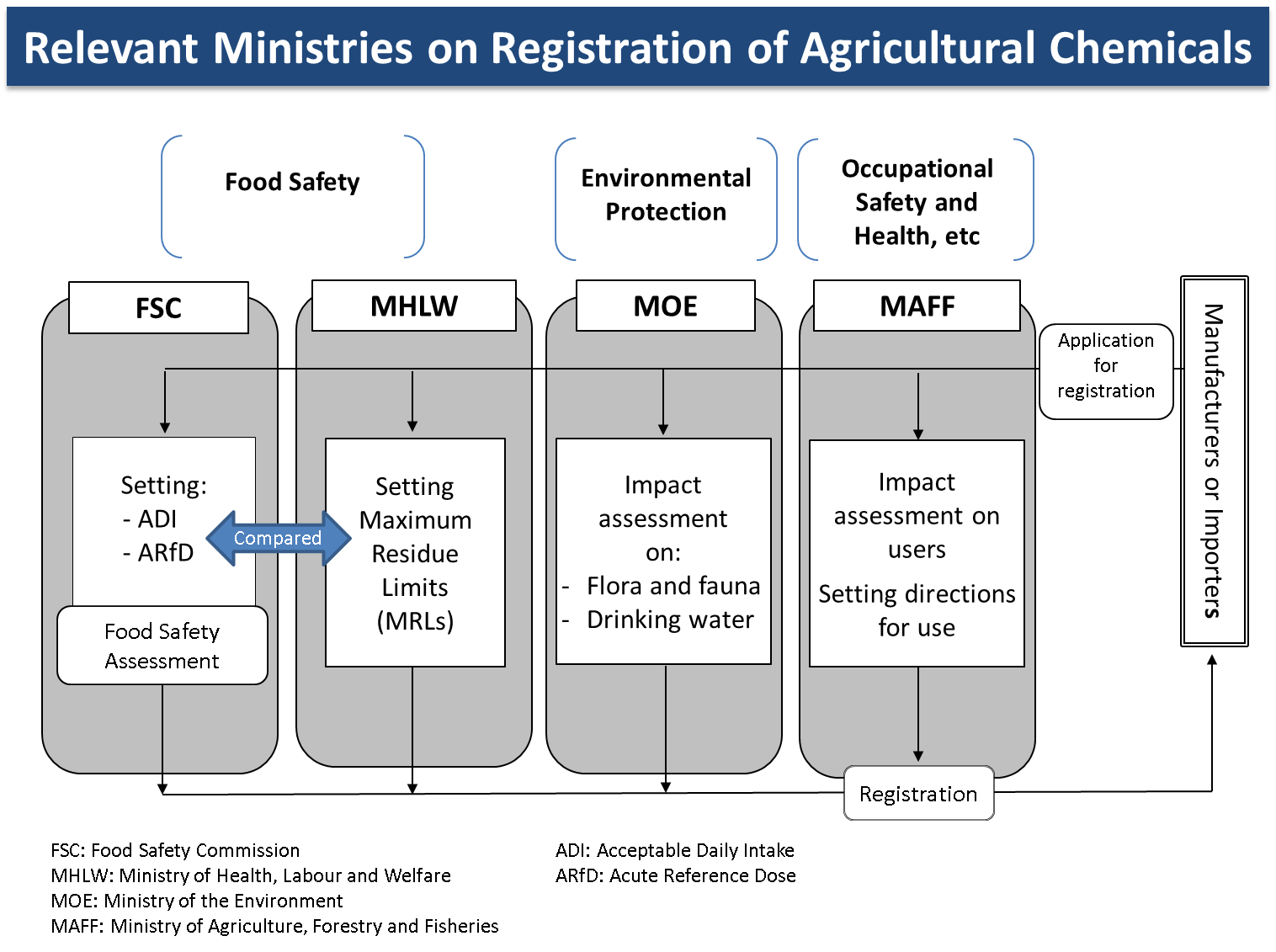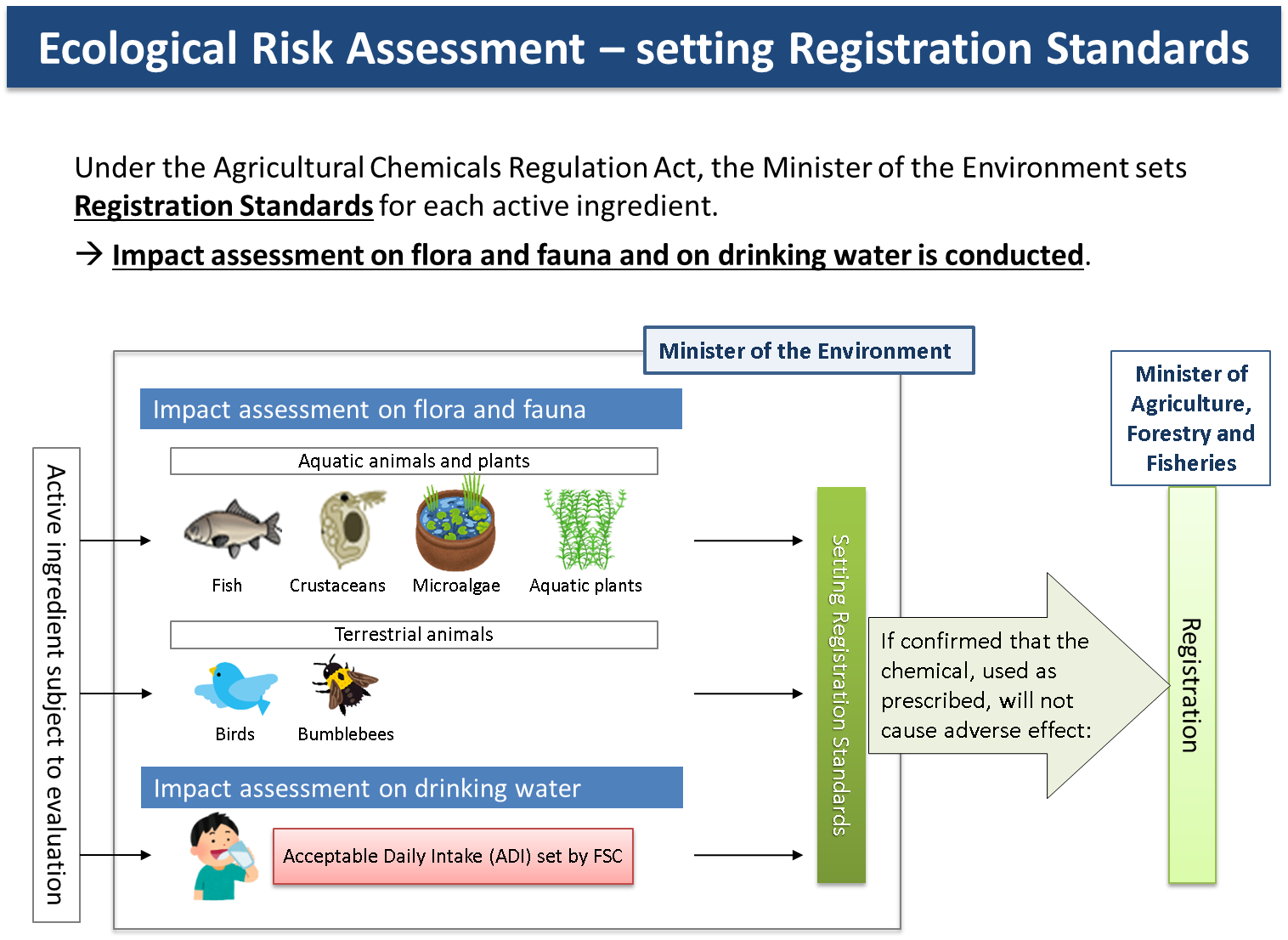Agricultural Chemicals
aOn this page:
Registration of Agricultural Chemicals
Under the Agricultural Chemicals Regulation Act, the Minister of Agriculture, Forestry and Fisheries registers agricultural chemicals only when they are found effective for plant protection and safe for health and the environment. Only registered ones can be manufactured, sold, and used.
Agricultural Chemicals Regulation Act (Act No.82 of 1948)
http://www.japaneselawtranslation.go.jp/law/detail/?id=3507


Registration Standards
The Minister of the Environment is responsible for setting registration standards regarding (i) Residues in crops, (ii) Residues in soil, (iii) Prevention of damage to flora and fauna, and (iv) Water pollution.
Of these, registration standards regarding (iii) and (iv) are set for each active ingredient by the Central Environment Council, and it is confirmed that the chemical, used as prescribed, will be unlikely to cause adverse effect on the environment. (See the figure below.)

Residues in Crops
Agricultural chemicals cannot be registered when the residue of their active ingredients on crops does not conform to the food standards of the Food Sanitation Act (Act No. 233 of 1947). When their active ingredients remain in forage crops, they cannot be registered when the residue on the livestock products produced using those forage crops does not conform to the food standards.
Residues in Soil
Agricultural chemicals cannot be registered when the residue of their active ingredients in soil are carried over to the succeeding crops and remain beyond the standards of the Food Sanitation Act.
Prevention of Damage to Flora and Fauna
Aquatic Animals and Plants
Agricultural chemicals cannot be registered when the Predicted Environmental Concentration (PEC) of their active ingredients in areas of public waters does not conform to the standards set by the Minister of the Environment based on the toxicity tests on aquatic animals and plants (fish, crustaceans, microalgae and aquatic plants, etc.).
Terrestrial Animals and Plants
Agricultural chemicals cannot be registered when the amount of their active ingredients that the terrestrial animals and plants (birds, bumblebees) living and growing around farmlands are exposed to does not conform to the standards set by the Minister of the Environment for each species, based on the toxicity tests on these animals and plants.
Water Pollution
Agricultural chemicals cannot be registered when the Predicted Environmental Concentration (PEC) of their active ingredients in areas of public waters does not conform to the standards set by the Minister of the Environment to prevent adverse effect on drinking water.
Reevaluations
A post-market reevaluation process has been introduced according to the revised Agricultural Chemicals Regulation Act enacted in 2018, in which the safety and other qualities of all the registered agricultural chemicals are reexamined on the basis of the latest scientific knowledge.
In detail:
1. Agricultural chemicals registered after the enforcement of the revised act (December 1, 2018) will be reexamined approximately every 15 years.
2. Agricultural chemicals registered before the enforcement of the revised act will be reexamined from 2021FY, according to the priority list*.
(*) Priority list on the reevaluation of existing agricultural chemicals
Taking into account the magnitude of impact on health and the environment, the order of reevaluation is determined according to the amount of each chemical used domestically.
Others
Survey of Water Quality Regarding the Agricultural Chemicals Used in Golf Courses
- FY 2024 Survey Results of Agricultural Chemicals in Drainage Waters from Golf Courses[PDF 47KB]
- FY 2023 Survey Results of Water Pollution by Agricultural Chemicals Used at Golf Courses[PDF 75KB]
- FY 2022 Survey Results of Water Pollution by Agricultural Chemicals Used at Golf Courses[PDF 74KB]
- FY 2021 Survey Results of Water Pollution by Agricultural Chemicals Used at Golf Courses[PDF 76KB]
- FY 2020 Survey Results of Water Pollution by Agricultural Chemicals Used at Golf Courses[PDF 81KB]
- FY 2019 Survey Results of Water Pollution by Agricultural Chemicals Used at Golf Courses[PDF 80KB]
- FY 2018 Survey Results of Water Pollution by Agricultural Chemicals Used at Golf Courses[PDF 520KB]
- FY 2017 Survey Results of Water Pollution by Agricultural Chemicals Used at Golf Courses[PDF 590KB]
- FY 2016 Survey Results of Water Pollution by Agricultural Chemicals Used at Golf Courses[PDF 779KB]
- FY 2015 Survey Results of Water Pollution by Agricultural Chemicals Used at Golf Courses[PDF 593KB]
- FY 2014 Survey Results of Water Pollution by Agricultural Chemicals Used at Golf Courses[PDF 658KB]
- FY 2013 Survey Results of Water Pollution by Agricultural Chemicals Used at Golf Courses[PDF 182KB]
- FY 2012 Survey Results of Water Pollution by Agricultural Chemicals Used at Golf Courses[PDF 145KB]
- FY 2011 Survey Results of Water Pollution by Agricultural Chemicals Used at Golf Courses[PDF 139KB]
- FY 2010 Survey Results of Water Pollution by Agricultural Chemicals Used at Golf Courses[PDF 293KB]
- FY 2009 Survey Results of Water Pollution by Agricultural Chemicals Used at Golf Courses[PDF 198KB]
- FY 2008 Survey Results of Water Pollution by Agricultural Chemicals Used at Golf Courses[PDF 202KB]
- FY 2007 Survey Results of Water Pollution by Agricultural Chemicals Used at Golf Courses[PDF 148KB]
- FY 2006 Survey Results of Water Pollution by Agricultural Chemicals Used at Golf Courses[PDF 50KB]
- FY 2005 Survey Results of Water Pollution by Agricultural Chemicals Used at Golf Courses[PDF 50KB]
- FY 2004 Survey Results of Water Pollution by Agricultural Chemicals Used at Golf Courses
- FY 2003 Survey Results of Water Pollution by Agricultural Chemicals Used at Golf Courses
Contact Us
Agricultural Chemicals Control Office, Environmental Management Bureau
mizu-noyaku@env.go.jp